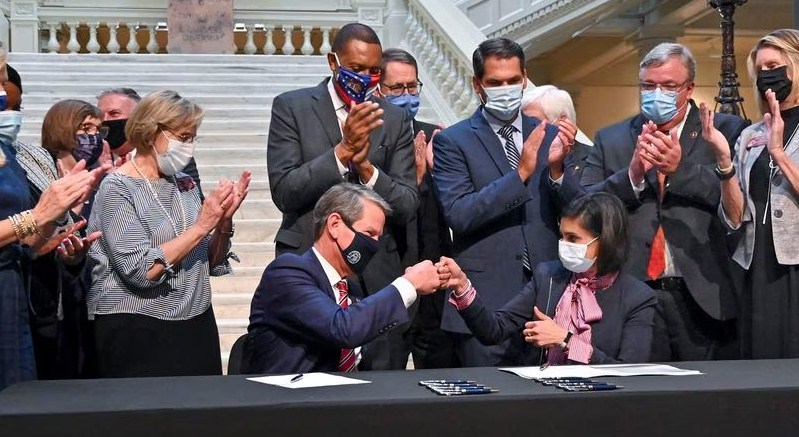What is Georgia Pathways to Coverage?
Georgia Pathways to Coverage is a new state health plan for low-income residents that was launched on July 1, 2023. It is the nation’s only Medicaid program that requires recipients to meet a work requirement. The program was created by Governor Brian Kemp in 2020 as an alternative to expanding Medicaid under the Affordable Care Act (ACA). The plan aims to provide health insurance to up to 100,000 people who earn less than $12,880 a year and are not eligible for traditional Medicaid or subsidized ACA plans.
To enroll in the program, applicants must work, volunteer, or participate in education or training activities for at least 80 hours a month. They must also pay monthly premiums ranging from $7 to $11, depending on their income level. The program covers basic health services such as primary care, preventive care, prescription drugs, and mental health care. However, it does not cover dental, vision, or long-term care services.
Why is the program controversial?
The program has faced criticism from public health experts, advocates, and the Biden administration for several reasons. Some of the main criticisms are:
- The program is too restrictive and complicated. Critics argue that the work requirement adds an unnecessary and burdensome barrier to accessing health care, especially for people who face challenges such as lack of transportation, childcare, or internet access. They also point out that the program excludes many people who need health care but do not meet the work requirement, such as caregivers, students, or people with disabilities. Additionally, they claim that the program is too complex and confusing for applicants and enrollees, who have to submit and verify their work hours every month and pay premiums on time.
- The program is less effective and efficient than expanding Medicaid. Critics contend that the program is a waste of taxpayer money and resources, as it costs more to administer and provides less coverage than expanding Medicaid under the ACA. They estimate that expanding Medicaid would cover about four times as many people as Pathways, with no work requirement or premiums, and at a lower cost per person. They also note that expanding Medicaid would bring more federal funding to the state and reduce uncompensated care costs for hospitals and providers.
- The program is harmful to public health and equity. Critics warn that the program will worsen health disparities and outcomes in Georgia, which already ranks poorly on many health indicators. They cite evidence from other states that have implemented or attempted to implement work requirements for Medicaid, such as Arkansas and Kentucky, where thousands of people lost their coverage and experienced negative effects on their health, employment, and financial stability. They also argue that the program will disproportionately affect people of color, women, and rural residents, who are more likely to be uninsured and face barriers to work and health care.
What is the status of the program?
The program has been off to a slow start since its launch on July 1. According to the Georgia Department of Community Health (DCH), which oversees the program, only 265 applications had been approved by early August. The DCH has projected that up to 100,000 people could eventually benefit from the program.
The DCH has said that it is engaging with stakeholders, community partners, and others to help spread the word about the program and assist potential applicants. However, some observers have questioned the state’s commitment and effort to promote and enroll people in the program. They have noted that there has been little public awareness or outreach campaign about Pathways, and that many eligible people may not even know about it or how to apply.
The program has also faced legal challenges from the federal government. The Biden administration has tried to revoke Georgia’s Medicaid plan once in February 2023, citing concerns about its legality and impact on access to health care. The state has sued the federal government to defend its plan, and the case is still pending in court. The Biden administration has said that it will continue to monitor the program and its effects on enrollees.
Meanwhile, the state has also begun a review of Medicaid eligibility following the end of the COVID-19 public health emergency. Federal law prohibited states from removing people from Medicaid during the emergency period. Georgia has already cut more than 170,000 adults and children from Medicaid benefits since June 2023, and thousands more are expected to be removed as the yearlong review of all 2.7 million Medicaid recipients in the state continues. Some of these people may be eligible for Pathways, but they may not be aware of it or able to meet its requirements.

